Issue No.19 / December 1-15,2015
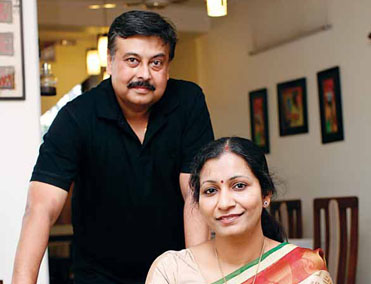
You will never find a perfect match. You will never find a perfect person and if you just keep on looking for a perfect person, it is impossible to get one in this world-Jayati
Saugata Mitra, Chief Peoples’ Officer, Mother Dairy and Jayati Mitra, a leading human resource consultant and Director of Abbscissa HR Services have cracked the code of the work-life balance and the seeming dichotomy of success versus harmony. They are successful professionals, and are equally at equilibrium in their personal lives. What is the secret of their success?
Saugata Mitra, Chief Peoples’ Officer, Mother Dairy and Jayati Mitra, a leading human resource consultant and Director of Abbscissa HR Services are sterling examples of how success is attained with love and harmony as the main ingredients.
Son of research scientist Dr. G N Mitra, Saugata Mitra is a well-known corporate leader. Having worked for premier multi-nationals and created a niche through innovation and intelligent human resource development, he has over two decades of experience in Fortune 500 companies. This well-known professional started his career with American transnational Union Carbide, followed by Japanese multinationals Sony and Sharp, after which he successfully in India-entry strategies for Japanese companies as the CEO of an Indo-Japanese business venture. Presently, as Chief People Officer & Member Management Team of Mother Dairy since 2007, Mitra has been providing Leadership and driving business and people agenda including Transformational interventions for organizational growth. At Sony he was Head, Human Resources & New Business. As a founding member of Sony India, he set up the organization from inception and provided leadership in driving people and business agenda from scratch. Wherever he went, he brought in new lines of business and innovation with considerable positive impact on the bottom line.
Jayati Mitra, educationist, is a post-graduate in Chemistry, a leading HR consultant and is Director, Abbscissa HR Services. Petite Jayati Mitra, besides being a leading human resource consultant, is a passionate housewife and doting mother. The tastefully decorated home in Delhi reflects her warmth and love for nature. A deeply spiritual person, Jayati has an elaborate sanctum sanctorum for worship. Tall and handsome Saugata Mitra is a scholar, besides being a wellacclaimed corporate leader. He has scripted several books on management.
Corporate Citizen speaks to this dynamic couple who have successfully balanced work and home, with harmony and happiness writ large on their faces. They have played the perfect parental role for their only son, Arijit.
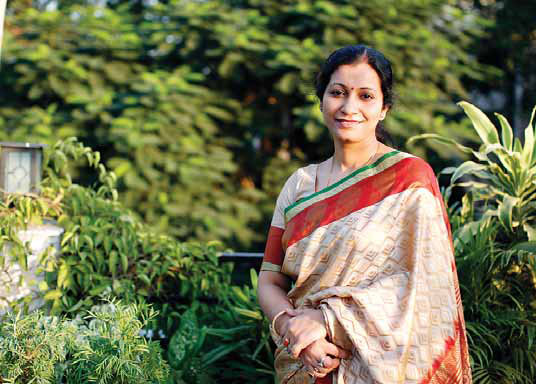
Then, he was 28 years old, working for Union Carbide, a job he clinched soon after his MBA from the Symbiosis Institute of Business Management (SIBM), Pune, and she had freshly post-graduated in Chemistry from Miranda House, Delhi.
Saugata states, “I met her when I was working in Union Carbide. I was about 28 then. I told my parents that I wanted to get married and needed somebody who was a professional and not a typical housewife. So I started reading the matrimonial ads in the Times of India and found a girl who had studied Chemistry. She was staying in Delhi then. I was in Kolkata for some work, so she came to Kolkata to one of her relative’s home and we met each other for the first time. Our chemistry matched instantly.
However, they did not exchange a single word between them, when they met for the first time at her uncle’s place in Kolkata. Says Jayati, “My mother had accompanied me, and he had his father, mother and maternal uncle with him. When we met we did not talk. For the first one hour I was talking with his father on the subject of Chemistry. I found myself very comfortable with him, so it immediately broke the ice and I did not feel odd about having ‘gone to see a boy’.”
Quips Saugata, on how his father was impressed by Jayati: “On a specific question my father asked her as to how did she know he was a teacher, she had immediately replied, ‘Because there is a red pen in your pocket, along with a blue pen’.”
Adds Jayati, “I was very comfortable with the people from the academic world, because I always had an inclination towards academics. I had never interacted with people from the corporate world. My father is an IPS officer and his circle of friends was always made up by government bureaucrats. I had a different perception of people from the corporate world and thought they had an arrogant streak in them, and hence felt I would feel the same about Saugata, as he had passed out from one of the premier B-schools. Though we did not talk during that meeting, I noticed there was a definite cultural fitment and felt that maybe our natures matched. Back then, we never used to think much about the person, and in marriage matters, parents’ views were important.’’
So, the chemistry worked and they were married in January 1993.
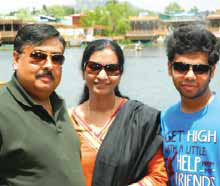
Cooking is something she had to learn after marriage. “I got married after completing my MSC and I was not good at cooking. He used to invite friends over for dinner regularly. So the positive thing is I learnt cooking. People say I am a good cook but he does not agree; he is always comparing me with my mother, who is an excellent cook. By the way, he too cooks well.’’
Saugata, adds Jayati, is very fond of home cooked food. “Sometimes I come back from office feeling tired and still have to cook the dinner. Then, he also chips in to help me make the dinner. When I see he is enjoying himself making the meal, it brings in me a renewed energy.’’
Saugata talks proudly about her care, saying, “After 23 years, her caring and her concern for me has become a habit. For example, if she is travelling, I know she will call me at about 6 p m. If the call doesn’t come, I become concerned and start worrying it has become such a habit. She is very understanding too.’’
The true test of their relationship came when Saugata turned entrepreneur and lost a lot of money. He confesses, “I am very bad at financial management. If I have a hundred rupees, I spend it all. She is the opposite she is a good money manager.’’
How did that happen? Reminisces Saugata, “After five years in Union Carbide and ten in Sony, I started a venture which incurred loss due to recession. It was a joint venture with a UK based company. So for one or two years we had to go through a very bad time. It was purely my miscalculation. I used to be very extravagant. After that, I have given her the management of our household finances. She is very methodical and thinks about future consequences before taking any step. She understands your need what time you require what.’’
Analysing the situation further, he states, “Very often in the corporate world, you go through those trials and tribulations. I have realised that there is money in corporate life, no doubt, but then the fear of losing money is also very high. You are used to a particular way of living because of that money. You develop spending habits; then you become attached to your affluent lifestyle. With that the stress starts, and that is how it gets into a vicious circle.’’
Human resource is an animate resource, it has feelings, emotion, and intellect. Instead of energizing them, the general tendency is to see how to kill their spirit. When you start killing that spirit, you alienate them and ultimately you will suffer-Saugata.
Saugata: My first job was through campus placement as a management trainee in Union Carbide. I was offered a monthly salary of Rs.3,500, which was huge money at that time. Union Carbide brought me into the corporate world and it was an excellent experience. Its work culture was ahead of the times. Multinationals treat management trainees like their sons-in-law. They used to have the business acumen of modernday MNCs and the human touch of traditional companies. It was a very good mix, which is not seen nowadays. My father was very happy when I got picked up for this multi-national. He had initially wished that I take up Science and pursue a bureaucratic or engineering career but when he found that I had no inclination towards that, he encouraged me to pursue MBA. Also, he realised that with the opening up of the economy in 1991, there was a good future for capitalism. I appreciate his vision and the support he gave at that time when it was generally a socialist world in India.
Jayati: My ultimate aim was to be in academics and teach. After marriage, I went to Kolkata. Immediately, I started teaching Chemistry for Std XI and XII. Chemistry was my passion and I love this subject. I have always been a serious kind of student. Teaching came to me so naturally that I didn’t have to prepare to teach the students.
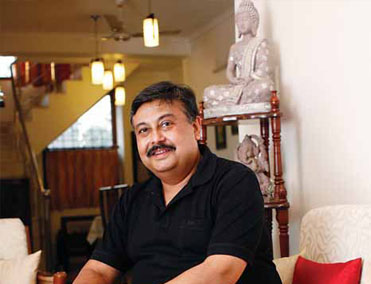
My company’s name is Abbscissa HR Services and we have been running it for the last 18 years. Abbscissa is a mathematical term in Geometry. An abscissa on a graph, with X and Y axis perpendicular to each other, is the shortest distance of a point from its coordinates and from both the axes. So for us, the literal meaning was that we show the shortest and the best to the clients. Now of course, we have diversified into other areas of HR consulting. Apart from research and recruitment, we are into HR interventions, HR consulting projects, HR systems and so on
I had pursued a part-time course in HR, alongside. Once my consulting firm became fullfledged, I had to give full time to the office. My husband was always busy, travelling to Tokyo and Singapore and all other places for his work. But my parents were here and they were a big support for me, and my child has literally grown up with them. He used to be with them for the whole day.
Saugata: I moved to Sony because Union Carbide got taken over by the Khaitans. The original owners had sold their stake in India after settling the Bhopal case. Secondly, at that time the primary job of HR was trade union management, industrial relations, long term agreements, compliance and basic HR interventions. I grew up very fast in Union Carbide. I faced strikes, sit-downs, agitations. In HR, if one has learnt industrial relations and know how to handle 200 or 300 people confronting you in a situation, the rest is very easy. In the five years with Union Carbide I grew from being a management trainee to a manager, and in those days becoming a manager was quite an achievement. There was no concept of a vice president or other such fancy designations. Even a deputy general manager was considered quite a big position. Very few people would reach the level of general manager and retire.
Sony was coming to India at that point of time, in December 1994. So I decided to move from Union Carbide and I was the first employee of Sony. I started Sony’s entire operations in India. I was with Sony for ten years. That work culture never left my life. At Sony, I used to look after the sales and HR. I had 1,000 employees in the factory. I ensured that Sony did not face labour union problems, gathering from my Union Carbide experience. I realised that a union is never formed by the workers. A union is formed with some support from a departmental supervisor. Also, unless there is support from the management, a union is never formed. So I knew how to tackle these intricate issues and so in Sony, even after ten years, there was no union.
Saugata: At Union Carbide, besides the statutory parts of the job, I learnt how you involve with the people. The role is very tricky, because as a management person, you are perceived as an employees’ person also. But if you become too much of an employees’ person, then you face problems from the other side. Learning how to balance the two is very important.
Today, even as a director, I do the same thing. One thing has to be understood, which very often corporates forget, is that in a business, one resource without which nothing moves is people. You may have the material, you may have the market, the machinery, but one resource that makes all the resources move is the human resource. Every time, there is a focus on reducing cost, there is too much fingering around this valuable resource. Human resource is an animate resource, it has feelings, emotion, and intellect. Instead of energizing them, the general tendency is to see how to kill their spirit. When you start killing that spirit, you alienate them and ultimately you will suffer. Their focus shifts from the job to revenge… an alternative path. And when it starts going that way, the management has to struggle to handle them. And once the disease creeps in, to kill or cure is extremely difficult.
In Sony, I ensured right from the start of recruitment that 80% of the workers would be women. I took people from the lower middleclass who came with aspirations. From among them, I sent many to Singapore and Malaysia, which they would have never even dreamt of. They were never made to feel like workmen. When you send someone from the factory to Malaysia, Singapore or Tokyo, other co-workers become enthusiastic to learn, so they can also get a chance to go abroad. So this way we did away with the feeling of alienation. Everybody got involved in how to do better, there was a sense of belonging. From group dynamics it became individual performance-oriented. As a result, the aspirations of these girl operators, who were Std X or XII pass grew so much that they would not marry anybody below the status of an engineer. So this had its negative aspect too, but that is a separate issue.
When you move them from one platform to another, there is a sense of belonging, knowledge enhancement, a feeling of success, and economic independence. We used to throw parties at fivestar hotels, spending Rs.14-15 lakhs and everybody from the operators to the MD would join. As a result, even today, that company is doing very well.
I left Sony primarily because they had taken a decision that they need to reduce the number of manufacturing units worldwide. I designed an excellent VRS programme for people going out. There were about 1,000 such people, with an average age of 20 to 30 years. I designed the VRS scheme in such a way that they got four months’ salary for every year of service they completed in the company, plus Rs. Two lakhs in addition, and three years’ medical cover free. I also hired naukri. com for re-employing these people.
Now, I thought, if I offered them an option, I should not be treated in a different way. So I also decided to take VRS. Whatever scheme they were given, I said I will take the same. Since I treated them as equals, I didn’t want to be treated as someone special. When I applied for the VRS, 970 people applied for VRS within the next one hour. The management was surprised because what would have taken many days, was over within one day. They requested that the factory be kept running for three more months, so they could clear VRS settlements. So after ten years with Sony, I left and started a venture with a UK- based company.
Being a mother, definitely those fears are there. But somehow, there is also a belief on our upbringing which will perhaps help him to know what is right and what is wrong. Now our son is 21 years of age and his father is really a friend to him and has been very open with him-Jayat.

In the meantime, because of my experience with Sony, I used to be an advisor to the MD of Sharp Corporation, an Indo-Japanese company in Pune. It wanted to bring a lot of Japanese SMEs to India. Then I decided to go back to the corporate world. In the corporate world, you always give to the vendors and to the people. The position also ensures you are in a power to give. Whereas in business, it is different. You have to ask. My wife works on her own, so while calling her clients, if somebody does not pick up the phone, she will call back ten times. In my case if a person does not pick up the phone in the first instance, I will never call back.
In your own business you have to go to your own field circle. You have to go and sit at the reception, keep on waiting, which at times is very humiliating. When you are used to certain things, certain protocol, when that does not happen, it affects you psychologically. You are not used to that shift in power structure.
Then I decided to return to the corporate world, and the Mother Dairy offer came up. I was called one day, and was told that they wanted to corporatise this company and as I had huge MNC experience, I could find solutions to the problems they faced. It was a farmers’ organisation, where they give remunerative prices to the farmers and provide affordable nutrition to the masses.
Mother Dairy is a subsidiary of the National Dairy Development Board (NDDB) but operates as a private sector organisation. It is not a Government of India undertaking. No government rule is applicable to Mother Dairy, it is applicable to the NDDB. NDDB was created by a Special Act of Parliament, thanks to the efforts of Dr. Kurien. Mother Dairy is a subsidiary an follows the rules of the private sector.
The challenge was to give remunerative prices to the farmers while giving affordable nutrition to the common man. Milk is the only affordable nutrition product available. So they wanted to corporatise it, changing Mother Dairy from a traditional organisation to a corporate one. Naturally, it had a pro-government image, but they wanted to change it. I was given an offer which was less than my last salary. At that point of time, I also had an offer from Bombay Dyeing, which was offering 40 percent more than what I was getting at Sony. I thought for a day or two. I said to myself that money would come if it had to, so let me take the Mother Dairy offer. So that was how I entered the Mother Dairy enterprise and continue to be with it even now.
If the family institution is not managed well, you will find an increase in neurotic cases. We were self-made people. Now, the children of these self-made people get everything on a platter-Saugata.
Mother Dairy today is not what it was about eight years back. Today it has been declared one of the top-three FMCG companies and one of the top 30 Great Places To Work For’ organisations. It has become a huge brand. Today, I feel proud that it has corporatized, that it is one of the best organisations, counted amongst the best FMCG outfits and lastly, it gives the sense of satisfaction that you are working for the nation.
Jayati:Arijit has always been pampered by Saugata, while I have been the disciplinarian. Father and son are very fond of each other. I have always been a strict mother, focusing on his studies. Presently, he is doing his final year of Engineering at Symbiosis, in Pune. I ensured that in this kind of environment, though we live a fast life, we devote our evenings to him. Spending time with him was very important to us. As soon as my husband came from office, he would be with him and the best part was, till Std X, my son used to sleep with him and without each other they were never ever able to get good sleep. When he went to Std XI, all of a sudden he started saying he was a grown-up boy. Now, even when he comes home for his semester breaks, he will cuddle with him and sleep with him so that’s the kind of relationship they have. Now that he has grown up, he discusses career, and future things.
Saugata: There are problems, when you have a single child. When he left for the hostel, I took at least six months to settle down. We are so close. And with me it was less of studies and more of other things in life. Let’s go to Singapore, let’s do this, let’s do that and so on. He is very intelligent. He knows that he cannot take his mother for granted but with me he knows how to get things, by arm-twisting and blackmailing me emotionally. And he knows I will give up. She doesn’t give up. She is a stickler, totally.
Are you not afraid that he stays in the hostel in an environment which is very liberal?
Jayati:Being a mother, definitely those fears are there. But somehow, there is also a belief on our upbringing which will perhaps help him to know what is right and what is wrong. Now our son is 21 years of age and his father is really a friend to him and has been very open with him. And I think that is the best part. As soon as I start from the office, the first thing I do is to give him a call, talk to him about his college and his day. He generally discusses all sorts of things with me including light and funny moments......even when he is upset or feeling low.
Jayati: You will never find a perfect match. You will never find a perfect person and if you just keep on looking for a perfect person, it is impossible to get one in this world.
Saugata:The only institution that has survived in the world is the family. For this generation, as a psychological support system, the joint family concept is gone. Siblings are also not there. Mostly there is a single child and this is the only institution they have to fall back on.
If the family institution is not managed well, you will find an increase in neurotic cases. In the generation we came from, we had to work. Whatever we have built, it is with our money, and not our parents’. Yes, parental money would be there, but the focus was on one’s own achievement. We were self-made people. Now, the children of these self-made people get everything on a platter
When I came to Delhi 22 years back, I wanted to buy a house. All the way from Bhubaneshwar, I came here and worked and got myself one. Now for these kids, they have it readymade.
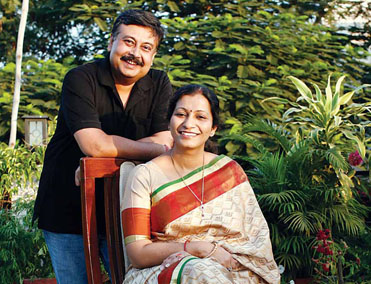
The second most important thing is that today you are neither part of the Indian philosophy, nor part of the Western philosophy. The moment you opt for the Western philosophy, you look for the Eastern philosophy. You may have never visited your relatives, but when you are in hospital, you expect your relatives to come and visit you and take care of you. By virtue of the Western philosophy, your social connect is minimum. But when you are in trouble, you want the Eastern philosophy.
Jayati:My philosophy in life is not to make your life too complicated. Be happy, be a nice person at heart, and I firmly believe that if I don’t do bad to others, things should be okay for me. I have never craved for materialistic things. I have been grateful to God for whatever he has given to me. Keep your needs to the minimum, because needs are never-ending. And do not be artificial; be what you are; be truthful and be a transparent person.
Saugata: Most youngsters do not see their potential but see others’ potential. That leads to stress. What I am, I should measure myself against myself. That leads to progress, happy progress
To a high sense of happiness. Now if I compare myself with what Mukesh Ambani is doing, I can never be happy. The greatest problem today is comparative deprivation. It is not why I have not got it, it is why he has got it. This is a disease. It was there earlier too. But earlier it was called jealousy. Or crab culture. Now, since he has got it, I am unhappy and since I am unhappy, my present performance goes down and when my present performance goes down, I am caught in multiple unhappy situations. My only advice is, measure your growth against yourself. Measure your success against yourself. Measure your happiness against yourself. You should be that measuring unit.
Jayati: I always tell B-school students to stay connected to their roots, which is very important. When you run after money, everything looks very fancy and glamorous and very nice. But at the end of the day or after some time, you will get tired of it. You have to come back and get connected with your roots, which will stabilise you. That is going to give you the real support. And I would tell parents too that while the children are growing up, they will have some tantrums. Parents should make it a point to make children understand that they are always there with them. I think that’s very important. He or she should try and come back to them when they are in trouble. They should know that they have support, not just financial but moral and emotional support to fall back on.
Arijit has always been pampered by Saugata, while I have been the disciplinarian. Father and son are very fond of each other-Jayat.
Jayati:He is not fond of travelling; he’s a home loving person. That’s my complaint!
Saugata:I like to travel, but I would like to travel in a larger group. And since she talks very less, even if we go, the interaction level is very low. As a result, when it is a larger group, it is more fun to travel. You know, I have an invitation to go to Lahore for a South Asia conclave, so I have already organised five-six families to go with us. So there would be a lot of interaction. For me, travel means group travel. We do go, but there is no extensive planning, lavish destinations or itineraries. We simply book a flight and go.
Saugata:I write books. My first book was published in 2008 by Sterling Publishers. It was called ‘Eighteen Management Competencies No Business Professional Can Ignore’.
Jayati:Which I co-authored with him. I did a lot of research for that book. So the research part was done by me and the writing part was done by him. I am also very fond of listening to old Hindi songs and Rabindra Sangeet. I love to paint too.
Saugata: My second book was on leadership titled, “Leading Change, Changing Lives”. This book I co-authored with Bhaskar Chatterjee, a gentleman and a senior IAS officer who was secretary in the Department of Public Enterprise. The book was published by Tata McGraw-Hill in 2012. It was released by Mr.Narayana Murthy at the World HR Congress in Mumbai.
With regard to the concept of the book, we have covered CK Prahlad’s bottom of the pyramid approach. The simple meaning of leadership is measured in terms of how many people’s lives you have impacted. So, more the lives of people you impact, the bigger the leader you are. This is the very basis of leadership. We also see in CK Prahlad’s theory, that at the bottom of the pyramid, there is a market that exists and we have about two billion of the world’s population below two dollars. There were 11-12 leadership stories covered in the book.
The third book was mainly about Brand Odisha, which was primarily for my state from where I started my childhood. And the book which I am in the process of writing is totally different, it’s called ‘The Resurrected’. I am trying to write on common people who led normal lives and worked their way up. I thought I should write about, common people, who are so courageous.
BY VINITA DESHMUKH